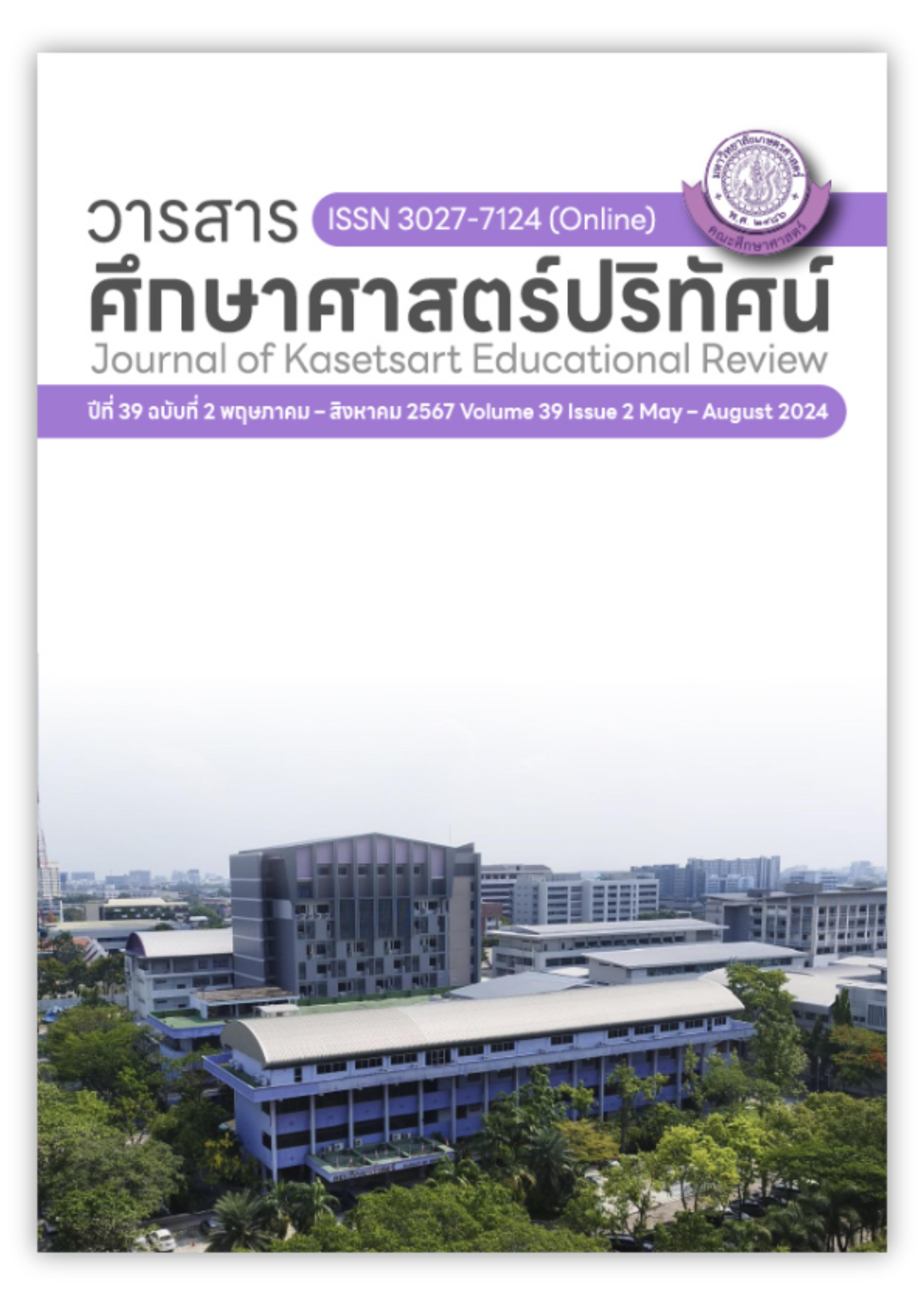ความฉลาดรู้ครอบครัวของนิสิตนักศึกษามหาวิทยาลัยในกำกับของรัฐ กรุงเทพมหานคร
คำสำคัญ:
ความฉลาดรู้, ความฉลาดรู้ครอบครัว, นิสิตนักศึกษาบทคัดย่อ
การศึกษาครั้งนี้มีวัตถุประสงค์เพื่อ 1) ศึกษาระดับความฉลาดรู้ครอบครัวของนิสิตนักศึกษา และ 2) เปรียบเทียบความฉลาดรู้ครอบครัวของนิสิตนักศึกษามหาวิทยาลัยในกำกับของรัฐ กรุงเทพมหานคร กลุ่มตัวอย่างที่ใช้ในการวิจัยครั้งนี้ คือ นิสิตนักศึกษาที่กำลังศึกษาระดับปริญญาตรี มหาวิทยาลัยกำกับของรัฐ ในกรุงเทพมหานคร จำนวน 400 คน ใช้วิธีการสุ่มกลุ่มตัวอย่างแบบหลายขั้นตอน เครื่องมือที่ใช้ คือแบบสอบถาม วิเคราะห์ข้อมูลโดยหาค่าความถี่ ค่าร้อยละ ค่าเฉลี่ย ส่วนเบี่ยงเบนมาตรฐาน การทดสอบค่าที และการวิเคราะห์ความแปรปรวนทางเดียว
ผลการศึกษา พบว่า
1. ความฉลาดรู้ครอบครัวในภาพรวม มีค่าเฉลี่ยโดยรวมอยู่ในระดับมาก เมื่อพิจารณาเป็นรายด้าน พบว่า ทุกด้านมีค่าเฉลี่ยโดยรวมอยู่ในระดับมาก โดยด้านการรู้เท่าทันการเปลี่ยนแปลงทางเทคโนโลยี มีค่าเฉลี่ยสูงที่สุด รองลงมา คือ ด้านการเปลี่ยนแปลงทางสังคมและวัฒนธรรม และด้านการปฏิบัติกิจกรรมร่วมกับครอบครัวและชุมชน
2. ผลการเปรียบเทียบโดยรวม พบว่า นิสิตนักศึกษาที่บิดามีอาชีพส่วนตัว/เกษตรกร และรายได้ของครอบครัว (ต่อเดือน) ชั้นปีที่ศึกษา และจำนวนสมาชิกในครอบครัวต่างกันมีความฉลาดรู้ครอบครัวแตกต่างกันอย่างมีนัยสำคัญทางสถิติที่ระดับ .001, .01 และ .05 ตามลำดับ และนิสิตนักศึกษาที่มีเพศ สายวิชาที่ศึกษา สถานที่อยู่อาศัย อาชีพของมารดา ระดับการศึกษาของบิดา ระดับการศึกษาของมารดาต่างกัน มีความฉลาดรู้ครอบครัวแตกต่างกันอย่างไม่มีนัยสำคัญทางสถิติ
เอกสารอ้างอิง
Best, J. W., & Kahn, J. V. (2005). Research in Education (10th ed.). Boston: Pearson Education Company.
Burke, J., & Larry, C. (2004). Educational Research (2nd ed.). Boston: Pearson Education Inc.
Chompikul, J. and et al. (2009). Relationship in Thai Families. ASEAN Institute for Health Development. [In Thai]
Chotrakul, S. (2016). Digital Literacy, Digital Natives and Famity. Journal of Management Science Chiangrai Rajabhat University, 11(1). 99-118. [In Thai]
Department of Women's Affairs and Family Development. (2011). Family Life. (7th ed.). Office of Welfare Promotion Commission for Teachers and Educational Personnel. [In Thai]
Inthanon, S. (2020). DQ Digital Intelligence. (3rd ed.). Child and Youth Media Institute. [In Thai]
Kanjanakuntorn, P. & Chaicmporn, S. (2019). Thai Family Relation Models in the Globalization Era. Journal of Social Development, 21(2). 164-175. [In Thai]
Krejcie, R. V., & Morgan, D. W. (1970). Determining Sample Size for Research Activities. Journal of Educational and Psychological Measurement, 30(3), 608.
Leekitwattana, P. (2016). Education Reaearch methodology. (11th ed.). King Mongkutis Institue of Technology Ladkrabang. [In Thai]
Office of the Permanent Secretary. (2022). Number of Students at public Universities. www.info.mua.go.th/info/table_stat_02.php?id_member=. [In Thai]
Payne, D. (2003). Applied Educational Assessment (2nd ed.). Nelson Thomson Learning.
Phonok, C. (2018, 5 Dec.). Family Literacy. Daily News, 25. [In Thai]
Piromkaew, S. (2010). Man and Society. (7th ed.). Kasetsart University. [In Thai]
Poovorawan, Y. (2021). New Normal Life. https://learningdq-dc.ku.ac.th/course/?c=1&l=5. [In Thai]
Roopleam, T. (2017). Development of Digital Intelligence Quotient program for ele mentary School Students. Master of Education. Educational Research and Evaluation. Mahasarakham University. [In Thai]
Royal Society. (2019). Dictionary of Contemporary Educational Termionology (Literacy). Office of the Royal Society. [In Thai]
Rungthongbaisuree, S. (2015). Research Reprts Study of tamily Relationships Pornthisan Village Pathum Thani. Pathum Thani: Rajamangala University of Technolody Thanyburi. [In Thai]
Rungthongbaisuree, S. (2017). Students’ Behaviors in Families. Journal of Liberal Arts Rmutt, 1(2). 13-20. [In Thai]
Sacchanand, C. (2020). Information Literacy in the Digital Environment. Journal of Social Sciences and Humanities, 46(1). 1-17. [In Thai]
Singlumpong, O. (2018). Cultural Transmission through the Narration of Indian Drama Series: Siya ke Ram. Dhurakij Pundit Communi cation Arts Journal, 12(1), 259-301. [In Thai]
Tangthianrat, Y. (2014). Man and Society. (15th ed.). Bangkok University. [In Thai]
Trisri, S. (2018). Study of Cultural Intlligence and Other Factors Affecting the Cultural Intelligence of Undergraduate Studets. Dissertation Ph.D. Applied Behavioral Science Research. Srinakharinwirot University. [In Thai]
Turner, R., & Carlson, L. (2003). Indexes of item-objective Congruence for Multiplied Dimensions items. International Journal of Testing, 3(2), 163-171.
Vadeesirisak, S. and et al. (2012). The Model of Cultural Intlligence Development to Build Leadership among the Business Organizations in Thailand. Doctor of Philosophy. Innovative Science Communication Management. Valaya Alongkorn Rajabhat University. [In Thai]
Wangaeo, S. (2008). Society and Culture. (11th ed.). Chulalongkorn University Press. [In Thai]
ดาวน์โหลด
เผยแพร่แล้ว
ฉบับ
ประเภทบทความ
สัญญาอนุญาต
ลิขสิทธิ์ (c) 2024 วารสารศึกษาศาสตร์ปริทัศน์

อนุญาตภายใต้เงื่อนไข Creative Commons Attribution-NonCommercial-NoDerivatives 4.0 International License.
บทความทุกบทความเป็นลิขสิทธิ์ของวารสารคณะศึกษาศาสตร์ มหาวิทยาลัยเกษตรศาสตร์ วิทยาเขตบางเขน
วารสารศึกษาศาสตร์ปริทัศน์ (Kasetsart Educational Review)






